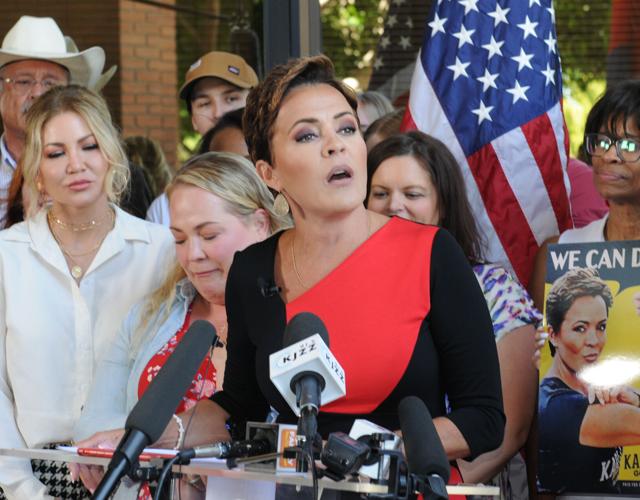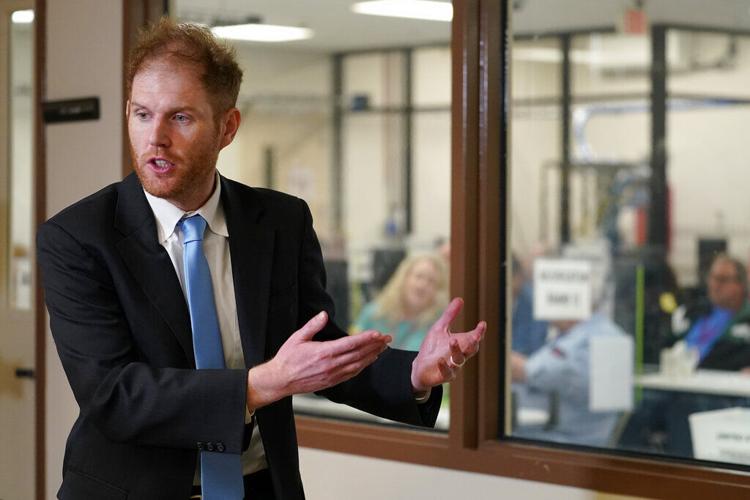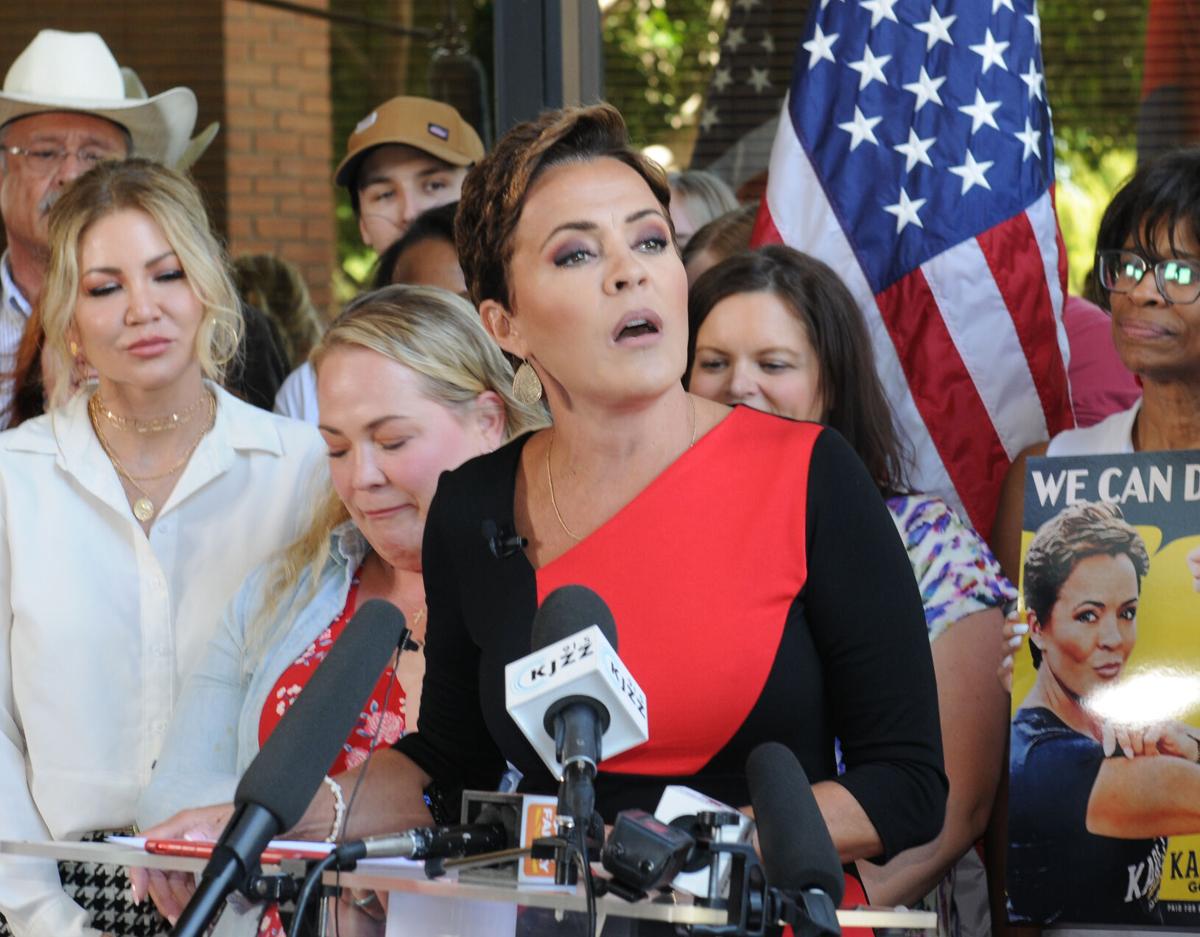PHOENIX — Maricopa County Recorder Stephen Richer is suing fellow Republican Kari Lake, saying she “spread intentional or reckless falsehoods’’ about his role in the 2022 election that harmed him and his family and resulted in threats of violence and death for family members.
In some cases, he said, she did it for financial gain.
In legal papers filed Thursday in Maricopa County Superior Court, Richer’s attorney, Daniel Maynard, said Lake, like all Americans, has a right to express views that others find distasteful or offensive as well as to criticize the government.
But he told Judge Jay Adelman that what Lake has said and done — accusing him of sabotaging the 2022 general election after she lost the governor’s race by more than 17,000 votes — crosses the line of what is legal.
Richer is seeking unspecified compensatory and punitive damages from Lake, her campaign and the Save Arizona Fund, which Lake has used to raise funds.

Maricopa County Recorder Stephen Richer
He also wants a court ruling that the statements made about him are false, as well as an order for Lake and those two other defendants to remove any false and defamatory statements about him from any websites and social media accounts they control.
There was no immediate response from Lake.
“Acted with actual malice”
The lawsuit, first posted by Arizona’s Law, a nonprofit journalism organization covering courts and the legal system, raises two issues.
One involves statements Lake has repeatedly made that Richer intentionally printed ballots with 19-inch images on 20-inch ballots to sabotage the 2022 general election. The on-site tabulators would not read the smaller images, resulting in lines at polling places and in some cases, according to Lake, people leaving without being able to vote.
Lake also has said Richer illegally inserted more than 300,000 phony early ballots into the system.
But Lake was making those statements at a Jan. 29 rally, “weeks after the Arizona Superior Court found that Lake had provided nothing more than ‘speculation’ and ‘conjecture’ to support her claims of intentional misconduct,” Maynard said.
A trial judge also said Lake had “brought forward no evidence’’ to contradict testimony that the 2022 election was conducted in accordance with established procedures.
“For that reason — as well as many others — Lake knew that her ballot size sabotage and bogus ballot injections claims were false before the Jan. 29 rally or, at a minimum, she was reckless as to the truth or falsity of those claims,’’ Maynand wrote in the legal filings.
She didn’t stop, Maynard said, citing repeated instances of videos, social media posts and podcasts made and posted through the end of May.
The lawsuit says that Lake, her campaign and the Save Arizona Fund all acted with “actual malice.’’
That is a crucial claim.
The U.S. Supreme Court has ruled that people who are considered public figures like Richer cannot sue for defamation unless they can provide by clear and convincing evidence that the statements were made with actual malice. In general that means the person making the statement knew it to be false or that the statement was made with a reckless disregard for the truth.
Richer testified in court, under questioning from one of Lake’s lawyers in the election challenge, that he is not responsible for Election Day operations, emergency voting or ballot tabulation. Richer said that is the responsibility of the Board of Supervisors, a situation he said is true in all 15 counties.
Moreover, Maricopa County Superior Court Judge Peter Thompson, who heard Lake’s challenge in December, rejected suggestions by Lake that errors in printing ballots at vote centers caused ballots to be miscounted, Maynard noted.
Potentially more significant, Thompson said there was no evidence presented that any voters were turned away or refused a ballot as a result of printer failures. In cases where ballots could not be read on site, voters had the option of putting them into a locked box to be tabulated later, he pointed out.
“The superior court likewise determined that Lake’s allegation of unlawful ballot insertions was implausible,’’ Maynard wrote.
Financial incentive alleged
Political motives aside, Maynard contended Lake and the Save Arizona Fund had a a financial incentive to defame Richer.
He said a website for the fund features a six-minute video of Lake discussing the 2022 election and accusing Richer of intentionally sabotaging the election. The site also asks visitors to “donate to support Kari Lake and Save Arizona,’’ seeking donations from $25 to $100,000.
Maynard said he thinks that just between Dec. 5 and Dec. 24 — when the trial judge ruled — Lake raised hundreds of thousands of dollars through the Save Arizona Fund. He said all of the funds raised are being used to boost Lake’s political ambitions.
For example, he said, the Save Arizona Fund paid for campaign events in Iowa where Lake has met with voters.
“That follows a prior pattern where Lake has told her supporters that fundraising money was needed to contest the election, but then spent the money raised on other items, including more than $35,000 on travel and hotel accommodations,’’ Maynard said.
The lawsuit also said the accusations Lake made about the 2022 general election are in character for her. Maynard cited statements Lake made about the 2020 general election, including that it was “stolen’’ from former President Donald Trump. Even though Lake won the 2022 Republican primary, she claimed she “was already detecting some stealing going on’’ in that election, he said.
In a written statement Thursday, Richer said he decided to sue after seven months of what he said has been constant harassment, intimidation and threats to himself and his family due to “falsehoods’’ being spread by Lake, her campaign and the Save Arizona Fund.
“While I followed the law and respected the will of millions of Arizona voters after the 2022 election, the defendants chose to engage in a concerted campaign to destroy my reputation, threaten my livelihood, and rob me and my loved ones of our safety and well-being,’’ he said. “I firmly believe in the protections afforded to all of us under the First Amendment, but when people harm their fellow citizens through defamation, they should be held accountable.’’
Get your morning recap of today's local news and read the full stories here: http://tucne.ws/morning






